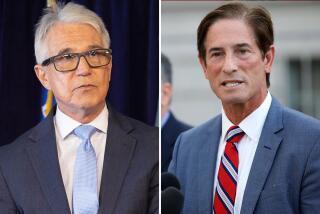Garcetti and Cooley Square Off in Debate
- Share via
The host of a debate between the two candidates for district attorney Wednesday night said he was tempted to introduce them this way: “In this corner, in the blue suit, from Los Angeles . . .”
He didn’t, but it wouldn’t have been entirely off the mark for the latest round in what is becoming a punishing battle between Dist. Atty. Gil Garcetti and his challenger, head Deputy Dist. Atty. Steve Cooley.
Cooley accused his boss of promoting a “draconian” three-strikes policy, and Garcetti said Cooley’s acceptance of campaign contributions from judges demonstrated a basic misunderstanding of legal ethics.
The two also tangled over issues that included Garcetti’s handling of the Rampart police scandal, environmental crimes and child support enforcement, and Cooley’s positions on gun control and term limits.
The encounter, before the Italian-American Bar Assn., marked the 10th debate between Cooley and Garcetti, who were forced into a runoff when they finished one-two in a three-way race in March. They have three more debates scheduled before the Nov. 7 election.
It also was the latest of many appearances the candidates have made before ethnic organizations. Garcetti began with a built-in edge, since his paternal grandfather was born in Italy and he is a member of the Italian American group.
But the crowd was peppered with people wearing Cooley buttons, and more than once violated ground rules by cheering for him. Douglas Collodel, association president, said Cooley has attended so many meetings of the organization that, “he’s kind of a de-facto member.”
Cooley all but promised to limit himself to two terms in office if he is elected. “Give me two terms,” he said. “That’s all I want.”
He said Garcetti had advocated a two-term limit when he was running against former Dist. Atty. Ira Reiner, and, “thanks to democracy, I think I will be able to limit his terms.”
Garcetti said he does not support term limits for his office, and that he is becoming more effective with experience.
“I have made mistakes as D.A., there’s no question about it,” he said. “But I have learned from those mistakes, and I have not repeated them. I am much more effective today than I was six or seven years ago.”
In answer to a question from the audience, both candidates said they were strongly committed to the enforcement of environmental laws.
Garcetti touted his record on environmental issues and said he had been a sponsor of a bill that would increase fines for oil spills in inland waterways, which is now on Gov. Gray Davis’ desk. Garcetti said the bill was in “great danger” of being vetoed and called on the audience to write Davis in support of it.
Cooley said Garcetti had gutted the district attorney’s environmental crimes unit and had failed to investigate the possibility of environmental crimes at the Belmont Learning Complex, the downtown high school abandoned by the Los Angeles Unified School District because of environmental risks.
In one of the more emotional exchanges, Cooley defended his acceptance of contributions from judges and deputy district attorneys, while Garcetti said the challenger lacked the ethical foundation of a first-year law student.
Cooley said he was “incredibly proud” of the support he had received from those who work in the criminal justice system. Addressing himself to judges, he said: “Thank you for helping me get there. I’ll make you proud.”
Garcetti said he “will not and never did” accept contributions from judges. Campaign contribution records, however, show several contributions to Garcetti from judges in past races.
“The whole issue is one of integrity, and the appearance of integrity,” Garcetti said.
The issue came up earlier in the campaign, and returned recently when Cooley sent a letter to every judge in the county outlining his positions and seeking their support. The letters included a return envelope for contributions.
A cross-section of judges, lawyers and political consultants interviewed this week said they could not recall any candidate for district attorney sending a solicitation letter to judges in the past, although most said they could find nothing wrong it.
“I don’t believe it’s ever been done before . . . [but] I know of no reason why it can’t be done,” said Victor Chavez, presiding judge of the county’s superior courts. He added, however, that he personally wouldn’t feel comfortable supporting a candidate for district attorney because prosecutors appear before judges.
The Canon of Judicial Ethics prohibits judges from endorsing candidates but allows them to contribute up to $500 a year to a political campaign. Judges themselves commonly send solicitation letters to each other.
More to Read
Sign up for Essential California
The most important California stories and recommendations in your inbox every morning.
You may occasionally receive promotional content from the Los Angeles Times.













